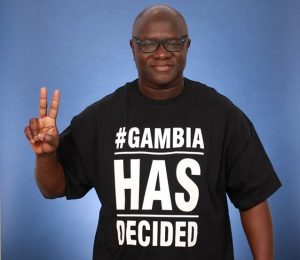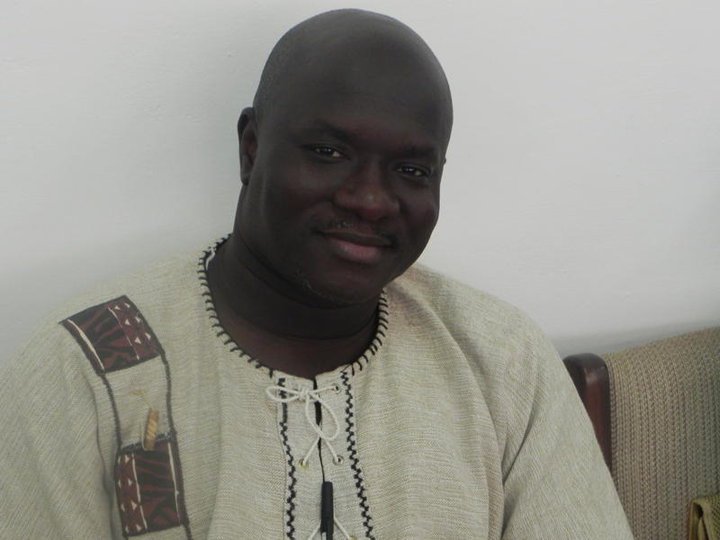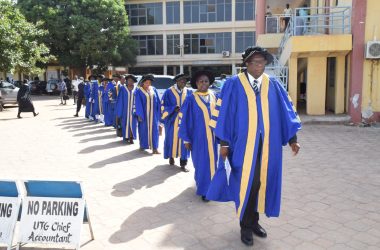
The Constitutional Review Commission (CRC) was inaugurated on June 4 by Pres. Adam Barrow. Soon after Lawyer Lamin J Darboe contended that the CRC was unlawfully constituted in a piece laden with flowery language . Yet in the entire piece Lamin did not spell out any act or process based on law that points to the illegality of the composition of the CRC. I wish to contend the contrary to say that by the CRC Act, the president had lawfully constituted the CRC.
Lamin first impugned the nomination and appointment of the Commissioners by claiming that the AG, TANGO, NYC and the Gambia Bar Association had no nominating authority hence their ‘nomination’ of Commissioners was unlawful. As he rightly stated the power to nominate the Chair and Vice Chair are vested in the Minister of Justice while the nomination of the other nine members was vested in the president ass per Section 4 of the Act. In terms of the appointment of the commissioners, this power was exclusively vested in the president in Section 5.
It appears Lamin’s contention is that those aforementioned organizations nominated the commissioners contrary to the Act. But the issue that Lamin must focus on is the process of nomination on which the Act was silent. The Act did not spell out how the president should nominate and appoint, i.e. what procedure should he follow. It only says in Section 5(2) and (3) that in making the appointments the president must consider certain factors such a diversity or values or status, etc of the persons to be appointed.
This provision therefore begs the question as to how then would the president nominate his nine people? Because the Act is silent on this, it means the president has the discretion to employ any means to nominate. He could unilaterally identify individuals on his own or he could consult with other stakeholders to submit names to him directly or through his Ministry of Justice or through some other channel.
I think it was therefore wise that the president did exactly that when the Ministry wrote to various stakeholders such as the Gambia Bar Association, TANGO and the National Youth Council, as far as I know, to ask them to provide three names out of which the president would nominate one. Consequently when those three names were submitted, it became clear that a selection was made out of them. Thus it can only be said that these were the nominees of the president in line with the Act.
Hence I think Lawyer Lamin Darboe was merely reading the Act from a mechanical point of view but did not consider the whole gamut of the process. For example TANGO was requested to submit three names and only one was finally nominated. Thus it would be wrong to say it was TANGO that nominated its candidate. Rather whoever chose from the three did the final nomination of that single person.
Lamin also impugned the appointment of the Chief Justice or his designate as the Chair of the Commission that it undermines the separation of powers principle. The position of chair and vice chair is stipulated in the Act under Section 4(1)(a) and (b) respectively. It says the chair of the CRC shall be the Chief Justice or a judge of a superior court. The vice chair is to be legal practitioner of at least ten years standing. Lamin says such appointment undermines separation of powers. I disagree.
In the drafting of a constitution for a country there is no better candidate to chair that process that a legally minded person, and for that matter the legal mind that holds the highest legal position hence the Chief Justice. The contention that the CJ will undermine separation of powers has not been made clear by Lamin even when he attempted to refer to some case laws and other sources which I found irrelevant to the subject.
Going through CRCs around the world one could see various patterns in which sitting or former judges or independent legal practitioners were appointed as chairs or vice chairs. Hence there is no universal rule as to who chairs the CRC. Here are examples. In 2011 when Tanzania set up its CRC, Pres. Kikwete appointed the former AG as Chair and the former Chief Justice as Vice Chair. In Ghana, former president Atta Mills constituted the CRC in 2010 and appointed an Emeritus Professor of Public Law as its chair. In India a retired Chief Justice chaired the CRC. Hence why cannot the Gambia have its Chief Justice, sitting or retired chair the CRC?

But more importantly the Chief Justice or his designate neither nominates nor appoint himself. Secondly the Chief Justice as chair or vice chair is leading a group of people who are all independent from many backgrounds such that the idea of the chair interfering or manipulating the work of the CRC is far-fetched. Any member can resign when such manipulation is attempted by the chair. Thirdly as Chair of the CRC, how would the CJ undermine or influence the other organs of the state such as the Executive and the Legislature since separation of powers relates to the three arms of the State?
Therefore how a CJ as chair of the CRC would conflict with separation of powers has not been explained by Darboe. But understanding what constitutes separation of powers, it is hard to see how such appointment is indeed an issue there. The potential risk one can reasonably allude to might be that the CJ may interfere with the work of the CRC. But then Lamin did not explain how the CJ could undermine the independence of the CRC or cause undue influence in the work of the CRC?
In fact the independence of the CRC has been guaranteed in the Act under Section 7 that in the execution of its function the CRC shall not be under the direction or control of any person or authority. Therefore how can any authority or person, even if such person is a member of the CRC interfere with the independence of the CRC? Lamin did not elaborate on this issue!
On the lack of parliamentary oversight in the nomination and/or appointment of the commissioners, this cannot be a reason for the unconstitutionality of the CRC. This is simply because the Act did not give such powers or functions to the National Assembly in the first place hence such powers cannot now be claimed by anybody. While this is a valid observation, it should have come earlier before the bill was approved by the National Assembly members themselves.
So either the Government deliberately failed to widely share the bill to seek public input or citizens did not actively engage in the process so as to raise this genuine issue of parliamentary oversight. Now that we got to this stage we cannot cry over spilt milk. In fact the NAMs themselves failed the Gambia when they had the opportunity but did not raise that issue so that they could have the power to vet who becomes a member. Unfortunately they just went ahead to approve regardless.
In conclusion I think the charge that the CRC was unlawfully constituted as per the Act is untenable. I contend strongly that the CRC was lawfully constituted.















LoL, Madi Jobarteh beats Lawyer Darbo … but Madi should have acknowledged MY HELP! This was my comment under Lawyer Darboe’s piece 2 days ago:
“Luntango
JUNE 8, 2018 AT 12:59 PM
Welcome back Mr. Darbo! Good to hear from you again.
My very simple (possibly simplistic!) response is this:
“… nominated by the President” will cover GBA, TANGO suggestions (not nominations!) which are then “nominated” by the President.”
Madi elaborated at length and addressed ALL the arguments set out by the Learned Lawyer. I give the case to Activist Madi, but wish to ask this question:-
WHY DOES THE EVIDENTLY EXTREMELY INTELLIGENT MR. MADI JOBARTEH ABANDON LOGICAL ARGUMENT WHEN ADDRESSING OTHER ISSUES? IS IT BECAUSE IN THOSE OTHER ISSUES LOGICAL ARGUMENT WOULD UNDERMINE THE CASE HE WANTS TO MAKE?
(Examples: “I condemn police for saying Amadou Scattred Janneh is ‘at large’ “, “I condemn police for tribalist inaction re: graveyard issue”, etc, etc).
Madi says,
“Hence why cannot the Gambia have its Chief Justice, sitting or retired chair the CRC”?
“Now that we got to this stage we cannot cry over spilt milk. In fact the NAMs themselves failed the Gambia when they had the opportunity but did not raise that issue so that they could have the power to vet who becomes a member. Unfortunately they just went ahead to approve regardless”.
I refer to the statements in captions as I concur with my/our Luntango.
By the way Madi, I consider you an astute analyst but when you refer to important issues, that can be revisited for review, as spilled milk, I get extremely worried as I do with your use of the word HENCE.
The word hence in Gambian parlance denotes a postulation as opposed to an inference based on substantive facts.
Luntango is right in that you have sought convenience on issues when the same suit you.
It is my opinion that you haven’t presented a substantive analysis that would serve to debunk or water down Lamin Darboe’s informed argument on point of law.
For full disclosure, I’m a fan of Lamin Darboe for reasons that I’ll disclose later.
Indeed Andy, I have been a fan of Lawyer Lamin Darbo over the years too. I “simplistically” thought Madi “won” – on the semantics of “nominated” v. “suggested”. But if you think Lawyer Darbo has a strong case, please go ahead and enlighten us more (you know I am a fan of debunking Madi – LoL). With anticipation …
Jollofnews 11th June 2018
Too much talk, too many dissertations, too many opinion papers about the drafting of a new constitution. The point here is, how long will it take to draft it (that involves a lot of our money), will the clauses/articles and every wording of the new constitution be read to the Gambian people (schooled and unschooled)? Most important, is the reaction of the population to the contents, if any possible referendum to opine before the final promulgation. But then how are the law enforcement agents (justice department personnel, The NAMS, lawyers, the police, the courts, the Seyfolu, the Alkalolu, the Badge messengers–“Konsinbalolu” going to execute the guiding body (our constitution) for all to benfit from?
Babu Soli: U R this brilliant question must not be burried without a response: IN ESSENCE your question is this: Who OWNS the Constitution – The Elite OR All Gambians? MAGNA CARTA in UK was strictly for the NOBILITY – just as the United States Constitution was for the Elite who wrote it (the Slaves were excluded).
Good question Babu; let the Gambia Government take the CRC to the Gambia people into the most remote of villages.
Sister Dr. Sarr and Mr. Halake: Perhaps, one of the most convoluted and tortuous argument I have ever read on Jollownews. When you compare Mr. Madi Jobarteh’s response to Mr. Lamin J. Darbo’s article, Mr. Alagi Yorro’s article is in another planet on its own; a planet, I never knew existed, by the way! Mr. Lamin J. Darbo made some persuasive arguments in his article. Whether his argument are valid is another matter altogether. Mr. Jobarteh takes a different position and try to poke holes in Mr. Lamin J. Darbo’s argument and is successful to a degree. The question is what are the arguments Mr. Lamin J. Darbo is making against the Constitutional Review Commission and what are Mr. Jobarteh’s arguments to counter Mr. Lamin J. Darbo’s arguments. The Separation of Powers argument jumps at you right from the start in both arguments, but there is equally a very important if not more important argument. That is doctrine of “Delegation Of Power.” Mr. Lamin J. Darbo’s argument seems strong on the delegation of power argument but weak on the separation of power argument. Mr. Jobarteh, on the other hand, seems strong on the separation of power argument but weak on the delegation of power argument. Here is the bottom line, if the statute that created the CRC gives certain powers to the President and AG in the formation of the CRC and both or either went beyond those powers, some illegality has been committed. Even where the CRC Act is silent on some powers, that does not mean the President or the AG or both can just do whatever they feel like. That is not how things work. A very important question to be answered is where is that line? Both Mr. Lamin J. Darbo and Mr. Jobarteh do not appear to adequately grasp the principle of Separation of Power. It is a principle and a great one, but it so delicate that most of the time it appears as if it does not exist at all. Now if you read a little bit of “The Spirits of Laws” by Charles Louis Secondat de la Brede, a/k/a Baron De Montesquieu, you see what I mean. The Chief Justice chairing the CRC is not an evil at all and if it is, it would be a small one in most situations, but I am not sure that is the case here. Now, Mr. Jobarteh tried to cover up a little bit of weakness in his argument where he enumerated a list of persons who have chaired CRCs. Mr. Jobarteh’s list is predominated by persons who have been former legal practitioners, but in the Gambia’s case we are talking about a sitting Chief Justice of the Supreme Court. If you read carefully, you see how Mr. Jobarteh did a good job of trying to cover up that weakness. In this debate, one person’s argument is based on principle and the other person’s argument is not. You figure out whose argument is based on principle and whose is not. Have a wonderful day guys and God bless you all.
My contention on the issue premises on the lack of diversity in the composition of the committee. Paucity in diversity of the committee’s memeberahip step from the fact that it does not represent the population mix in terms of skills, education and other predisposotions.
Once again it appers this constitution will be the product of secularist and western educated elites who are in key positions and virtually control the process. Not a single islamic or Christian scholar, as far as I know is included. When the population is 95% muslim it accord common sense and fairness to our spiritul imperative to include people from islamic scholarship to give advice on the islamic view on certain religuously relevent constitutional issues.
It appears to me that this constitution will be an elite document, imposed on the people of the Gambia. It will hardly represent the aspirations of majority of the local people whose lives the constitution will govern.
At least former president did included Islamic scholars just to show diversity but to undermined their views which essentially mirror the views of the majority of locals but were advertently sidelined. Example is the age of president, enhancing role of Islamic courts and some social issues. Now thay we have a democtatic dispensation, it only sensible to inculcate Islamic perpectuves into the constitution. I am sure they will represent the views of the unspoken, unrepresented and silent majority.